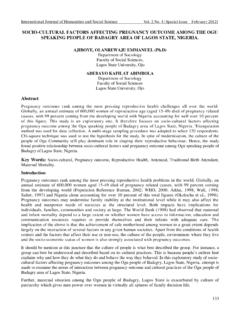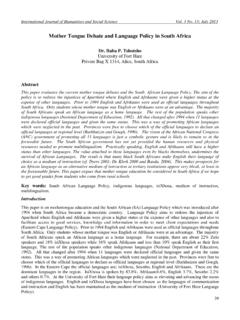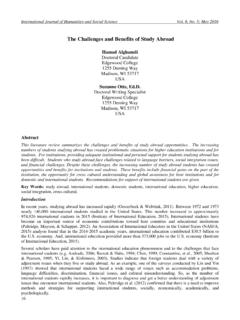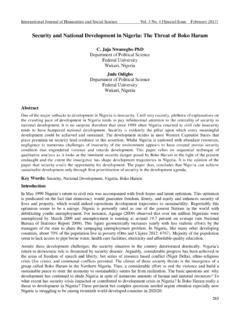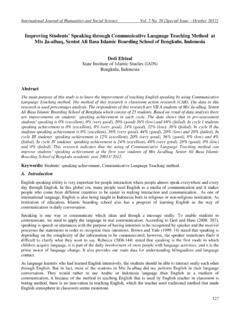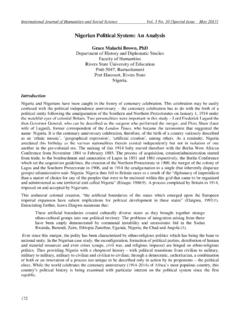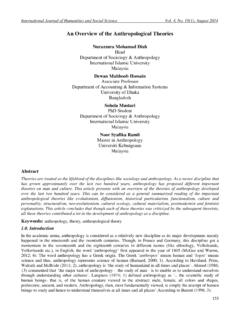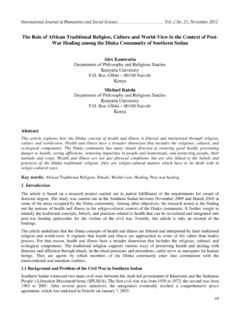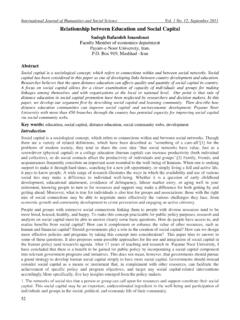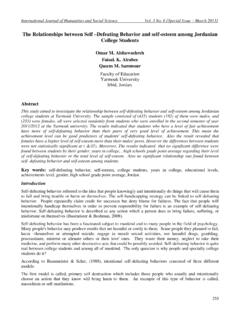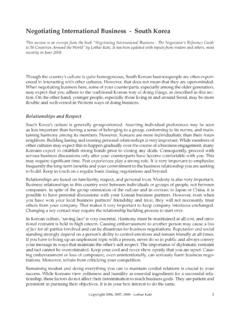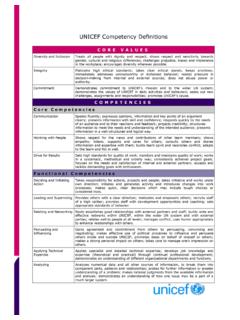Transcription of The Impact of Globalization on Africa - ijhssnet.com
1 International Journal of Humanities and Social Science Vol. 3 No. 15; August 2013 85 The Impact of Globalization on Africa Alhaji Ahmadu Ibrahim Department of Sociology Yobe State University PMB 1144, Damaturu Yobe State, Nigeria Abstract Globalization as the process of intensification of economic, political, social and cultural relations across international boundaries aimed at the transcendental homogenization of political and socio-economic theory across the globe, impacts significantly on African states through systematic restructuring of interactive phases among its nations, by breaking down barriers in the areas of culture, commerce, communication and several other fields of endeavor.
2 These processes have impelled series of cumulative and conjectural crisis in the international division of labour and global distribution of economic and political power; thereby qualifying basic African feature to be poverty, diseases, squalor, and unemployment among other crisis of under development. This paper was aimed to examine both the negative and the positive impacts of Globalization on African states, and suggest some recommendations among which are to improve democratization process, make the task of poverty eradication more indigenous, etc. Introduction Globalization according to Akindele (1990) refers to the process of the intensification of economic, political, social and cultural relations across international boundaries.
3 Globalization is principally aimed at the transcendental homogenization of political and socio-economic theory across the globe. It is equally aimed at making global being present worldwide at the world stage or global arena (Fafowora, 1998). In other words, as Ohuabunwa, (1999:20) once opined: Globalization can be seen as an evolution which is systematically restructuring interactive phases among nations by breaking down barriers in the areas of culture, commerce, communication and several other fields of endeavor. Simply put, Globalization is the term used to describe the changes in societies and the world economy that result from dramatically increased international trade and cultural exchange.
4 Cerry (1994) also said, Globalization describes the increase of trade and investment due to the falling of barriers and the interdependence of countries. In specific economic contexts, the term refers almost exclusively to the effects of trade, particularly trade liberalization or free trade. Banjo (2000), insisted that the process of Globalization is impelled by the series of cumulative and conjectural crisis in the international division of labour and global distribution of economic and political power, in global finance and the functioning of national states. Within the parameters of the foregoing, Globalization could be correctly defined from the institutional perspective as the spread of capitalism (MacEwan, 1990).
5 Beyond this simplistic analysis of Globalization in terms of capital inflows and trade investment, it is important to state that Charlick (2000) emphasized that, it has been of disastrous consequences to the governments and people of the African continent. Globalization according to Ohiorhenuan (19998), is the broadening and deepening linkages of national economies into a worldwide market for goods and services, especially capital. As Tandon (1998b) once opined, Globalization seeks to remove all national barriers to the free movement of international capital and this process is accelerated and facilitated by the supersonic transformation in information technology.
6 It is principally aimed at the universal homogenization of ideas, cultures, values and even life styles (Ohiorhenuan 1998:6) as well as, at the villagization of the world. Expanding this argument, Gordmier (1998), argued that it is principally concerned with the expansion of trade over the oceans and airspace, beyond traditional alliances which were restricted by old political spheres of influence. Center for Promoting Ideas, USA 86 Very critical to our understanding of Globalization is the dire need to use it according to Dumming (1998) as a synonym for liberalization and greater openness. It is within this preview we can argue that Globalization is mainly a phenomenon of capital mobility.
7 Its two prongs are: (i) foreign direct investment and (ii) international portfolio flows. The concept of Globalization is global and dominant in the world today. It was created by the dominant forces to serve their specific interests. Simultaneously these social forces gave themselves a new ideological name the international community - to go with the idea of Globalization (Madunagu, 1999). Globalization has turned the world into a big Despite the ambiguities of the concept, the essential nature of Globalization is the compression of space and time, as a result, the world becomes one, and interactions among diverse people begin to look like those within a village.
8 Thus terms such as one world and villagization . In its contemporary form, Globalization is driven by variety of forces. These, Colle (2000) argued are flow of financial and economic resources with particular reference to the flow of goods and services and, to a large extent, labour, technology, transport, communications and information technology, the spread of culture from one corner of the world to the other, and global diffusion of religious ideas as well as ideologies. Definition of Concept: What is Globalization ? Globalization means different things to different people. Some say it is the movement of people, language, ideas, and products around the world. Others see it as the dominance of multinational corporations and the destruction of cultural identities.
9 Extracting from the Globalization website , Globalization broadly refers to the expansion of global linkages, the organization of social life on a global scale, and the growth of a global consciousness, hence to the consolidation of world society. Such a definition captures much of what the term commonly means, but its meaning is disputed. It encompasses several large processes; definitions differ in what they emphasize. Globalization is historically complex; definitions vary in the particular driving force they identify. The meaning of the term is itself a topic in global discussion; it may refer to real processes, ideas that justify them, or to a way of thinking about them.
10 History of Globalization Historically, Devet (1993) summits that; the process of Globalization had started in a small way in the nineteenth century. Toyo (2000) records that Globalization began when capital moved from Europe to open up new areas in America and Australia, mostly in the building of rail road systems and agriculture that would be central to the expansion of capitalism. The subsequent maturation of joint-stock companies and developments in the areas of banking, industrial capital and technology, aided among other things, the scramble for and partitioning of Africa and, its then attendant rapacious exploitation of these parts of the world. Ohuabunwa (1999) argues, even though, the pre-eminence of Globalization as championed by America was interrupted by the cold war era, with the effective end of the latter in 1990, the west no longer need to compromise as before, its ideology of Globalization culture on the account of communism.
